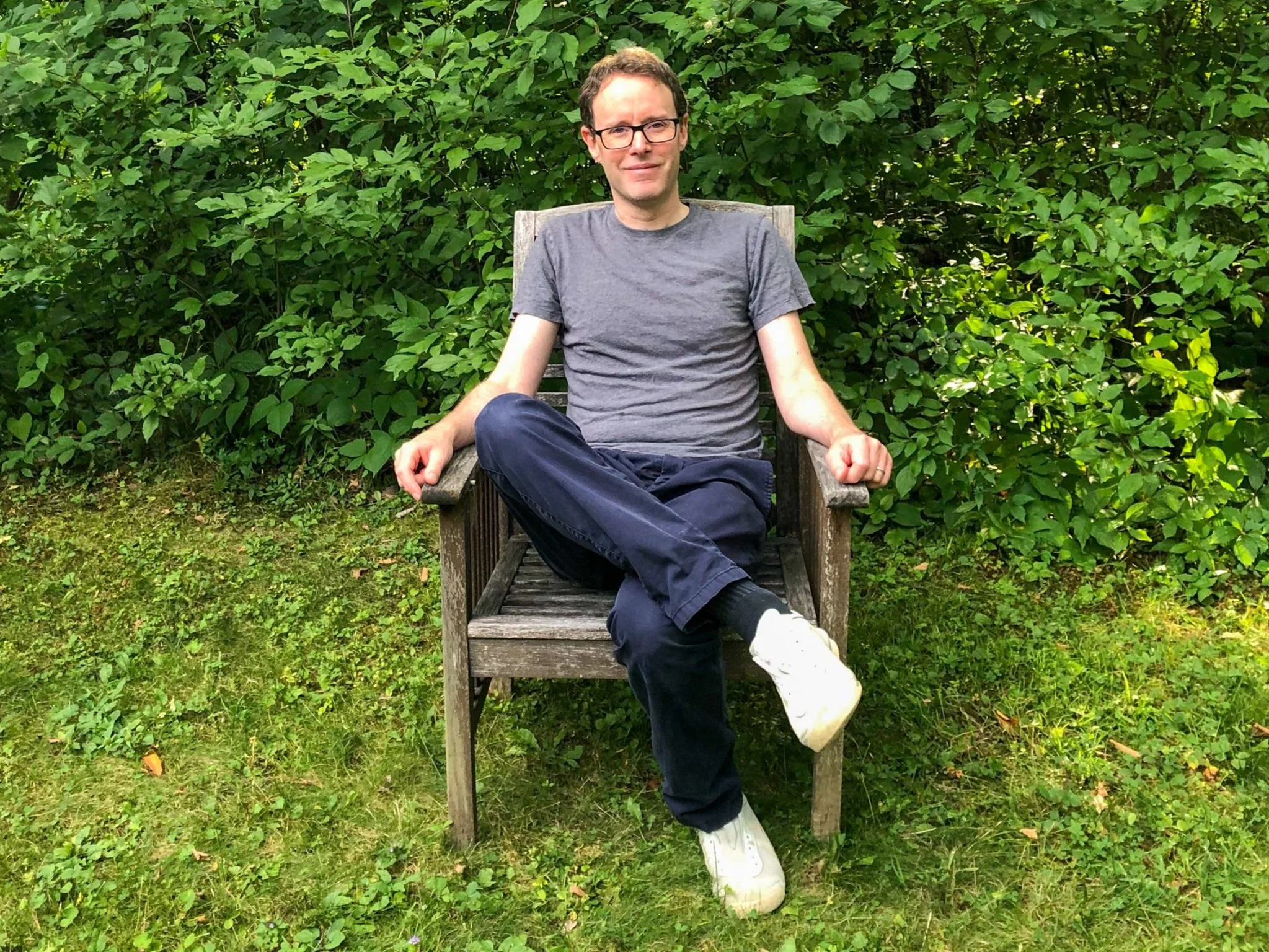An Interview with 350VT Volunteer Roger White
By Claire Greenburger
Claire Greenburger is the 350Vermont Media and Communications Fellow for Summer 2022. Claire is a Middlebury College student, studying environmental justice and creative writing.
“That’s the sad truth that we’re seeing anywhere you go— the worst effects [of the climate crisis] are borne by the people that have the least resources to cope with them.” – Roger White
Can you tell me a little bit about yourself? Where in Vermont do you live, and how long have you lived here?
I’ve lived in Middlebury for about 12 years. My wife and I moved up from Brooklyn when she got a job teaching at Middlebury College. I’m an artist, so my work is fairly portable.
What kind of art do you make?
I’m a painter.
What’s something that you love about Vermont?
After the shock of adjusting to Vermont winters, we discovered that embracing it in the form of winter sports was the way to go. So, after not having skied since I was in high school, I bravely tried to take up that sport again. I love that about Vermont.
I love the fact that there are not a lot of people here, and it’s possible to actually get to know your neighbors.
How is climate change impacting your life in Vermont?
I don’t think that I’ve been here long enough to feel viscerally that the climate is changing.
I grew up in California, and that’s a different story. Every time I go back to California, I can see the physical differences in the landscape. It’s like it’s bleached out––it’s much drier. I’m concerned every summer for my family that lives there because of the fires. And over a lifetime, that sinks into your bones.
There are places in the world where climate change might not appear so starkly—perhaps Vermont is one of those places––where it seems that we’re insulated from really dramatic effects. But that’s, of course, misleading. It’s important to always be mindful.
For sure––in Vermont, it’s easy to feel isolated from the effects of climate change, which puts us in a more passive position than if we were somewhere else, like coastal California, which is threatened by sea level rise and wildfires and more extreme natural disasters.
We were here for Hurricane Irene. It was incredibly stark to drive around the state after that and see the extent of the damage, which one could argue was as bad as it was because the climate is changing.
There was definitely some bad flooding from Irene in Vermont. And I know, from some research I did at Middlebury, that it was particularly lower income people that were impacted because a lot of the mobile homes in Vermont are located in low lying areas that are more vulnerable to flooding.
Absolutely. That’s the sad truth that we’re seeing anywhere you go—the worst effects are borne by the people that have the least resources to cope with them.
What motivated you to first get involved with 350, and why did you feel like you needed to take action on climate change?
I noticed over the years that, each time the UN panel on climate change releases their yearly report, they always try different ways to capture the seriousness of the situation—to make people alarmed and hopefully jolt us all into action. One year, I was picking up my daughter after school, after having read the New York Times article about that year’s report, and it must have been an especially dramatic headline because it hit me very, very strongly. I had this real climate grief experience. I’d never heard that term before.
I was just devastated––thinking about the future of Vermont, and the world, and my daughter’s future.
I felt absolutely gutted, so I thought that I could either sit there and be gutted and do nothing or be gutted and try to do something; 350 seemed like a great way to do the latter.
I think the organization does a great job of being welcoming to people with all sorts of different backgrounds, kinds of skills, knowledge, and abilities. I’m not from any scientific or ecological background—but it’s possible to link up with other people and try to do something.
Yeah, that’s definitely been my experience with 350VT, too. And I think that 350 does a great job meeting people where they’re at because not everyone has a ridiculous amount of time to devote to activism––people are working, they have lives and difficult schedules. I think that’s really important.
What is your role in 350VT now? Can you tell me about a specific project or action you’re working on and what the Middlebury node is up to?
When I made contact with the organization, there wasn’t a Middlebury or Addison County node. But last year, a couple other people got more involved, and we got together to officially form a node.
Right now, we’re working on a “listening project” to educate ourselves about what our neighbors are thinking about climate change in Vermont and to hopefully make climate justice part of a broader conversation. This will also be helpful for us to know, so that we can organize more effectively.
So, members of our node have been posting on Front Porch Forum, asking questions, and asking for feedback to get a conversation started. We have some public events planned, [which would be] very informal discussions. We’re also working towards a campaign where we put boxes with postcards in various gathering places, to see if we can invite people to submit their thoughts in writing.
That sounds great. I remember hearing about the listening project in its early stages, and I’m really excited about it because I think storytelling is so important. That’s why I’m doing these interviews; I think stories can change people’s minds and open their eyes to new ideas.
Why do you think that this listening project is so important?
I think it’s important because the people that gravitate to this kind of work are often coming from a certain political background or sensibility.
But we’re obviously not the only people with a stake in how Vermont will change in the future, and it’s important to be as inclusive as we can. Everyone shares these concerns, is affected, and has stuff to contribute. So, on one level, it’s a way of reaching out and locating allies that we don’t know we have.
Yeah, and I think sometimes conversations around climate change can feel alienating to “non-liberals” and “environmentalists.” But, of course, everybody in Vermont will be impacted in some way, and I don’t think people should feel isolated from the movement.
Absolutely. I think it’s really important that [these conversations become] very, very mainstream. We were talking in the node about our hope that the discussion about climate change becomes a real “kitchen table discussion”––alongside the school system and whether there should be a Chipotle in the Hannaford center.
Too often it seems very esoteric, or a discussion that you can only participate in if you’ve done a certain amount of reading. I’ve done little to no reading, [but I feel I can] participate in the discussion simply because it affects me as much as everyone else.
And you mentioned that you have a daughter, who I think I’ve actually met briefly in the Middlebury Co-op. As a parent, do you feel like you try to have conversations with your daughter about climate change? Because it is, as you’re saying, quite a daunting and overwhelming conversation, and I think it’s scary, and people are careful about how they talk to children about it.
They’re careful about how they talk to themselves about it because it is so daunting. It’s not just when we talk to kids: the way we think about it can be overwhelming for grown-up people too.
I think they do a very good job of introducing this idea at her school––that this is happening and that it’s a very serious situation, and it’s something that we can and need to address. And when I talk to her about it, I try to emphasize all the things that people are doing, as well as the problems and the challenges.
Yeah, I think framing it in a solutions-based mindset can be really helpful and important.
What do you see as the most important direction or point of focus for the climate justice movement right now? And where do you think that 350VT should be directing its attention and efforts moving forward?
The first thing is [diversifying] allyship because I think everyone can agree on some basic aspects of climate justice. We should try to meet the challenges of the climate crisis in a way that’s fair for everyone, which seems pretty reasonable. We should try to change our behavior, attitudes, and policies in a way that doesn’t make the problem worse. That’s pretty obvious. And I think that if we focus on those common values, we can make the movement bigger.
The other thing I think we should focus on is education. In my short time with the group, I have learned so much about what I didn’t know about how the energy sector works in Vermont and how policies around renewable energy are written. I think most people––and I include myself in this––really have no idea or are only beginning to grasp the ways that we could change our society to better meet the needs of the climate crisis. So, I think education is a huge one.
And also, how do we get people to want to learn about it?
That’s hard. Half the stuff I read, I read through my fingers because it’s scary and overwhelming. Often, it’s also very technical and boring. But it’s possible.
Given all of the daunting information and bad news that we face about the climate crisis, what keeps you hopeful and wanting to stay involved in the fight for climate justice?
Historically, we often come to realize how little we’ve understood a situation, and that changing it is possible. We can look back at things that we’ve changed about our way of life to make the world better. Recently, people have been reminiscing about the crisis of the ozone layer––which seemed unsolvable at a certain point. [But then,] policies were changed to deal with it, and society didn’t end because we reduced our use of CFCs.
So, I think that it’s heartening to look at problems that we’ve tried to solve in the past.
This is a much bigger problem, but I think we can do something. The other thing that keeps me hopeful is being in touch with people younger than myself who have a lot of energy around this set of issues. That’s very inspiring to see.

